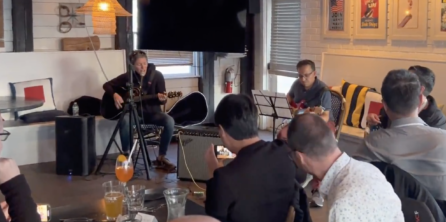Music, Mentorship, and Medicine: Highlights of the NYSCF Innovators Retreat
NewsThis May, we gathered once again in beautiful Montauk for the NYSCF Innovator Retreat, in the 13th installment of an annual meeting where the NYSCF – Robertson Investigators, NYSCF – Druckenmiller Fellows, and NYSCF Research Institute scientists come together to share four days of pioneering research, camaraderie, and collaboration.
“It is always exciting to bring these groups together and see the seeds of innovation being sowed,” remarked Richard Ha, Director of External Programs. “They have already achieved so much, and I look forward to following their continued journeys to bring promising research to patients.”
Tackling Big Questions in Science
Each Investigator shared the latest in their research, highlighting meaningful progress toward bridging gaps in knowledge and furthering their respective fields.
Florian Merkle, PhD, of University of Cambridge, detailed his research on how body weight is regulated by a specific type of neuron, and the ways in which his group is exploiting this knowledge to figure out how Ozempic and other anti-obesity drugs work.
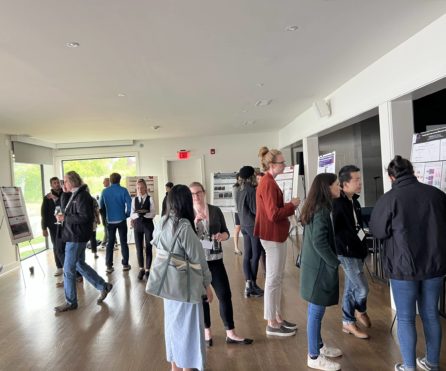
Ya Chieh-Hsu, PhD, of Harvard University, recounted how a forgotten cage of mice during the pandemic lockdown led to the serendipitous discovery of how hair turns gray in response to radiation, and the role of sensory neurons in this process.
Elaine Hsiao, PhD, of University of California Los Angeles, detailed her research into understanding the protective effects of the ketogenic diet in people with epilepsy that do not respond to normal drugs, and how she’s applying this knowledge to launch a clinical trial.
Kara McKinley, PhD, of Harvard University, shared her findings on the evolutionary origins of menstruation, and how her group is leveraging them to engineer a mouse that menstruates in order to build better models of the endometrium.
Catherine Jensen Peña, PhD, of Princeton University, outlined her work on how childhood trauma (such as that experienced in detention and separation from parents) primes hypersensitivity to stress later in life through epigenetic modifications in neurons.
Tomasz Nowakowski, PhD, of University of California San Francisco, detailed the “crazy direction” of his research towards understanding how specific cell types form in the brain, which is starting to reveal how the neurons in the brain’s thalamus (the relay station of all incoming motor and sensory information) develop.
Amber Alhadeff, PhD, of University of Pennsylvania, shared updates on her lab’s work to uncover the neural mechanisms behind us getting ‘hangry’, as well as the ways in which different nutrients signal our brains that we have eaten.
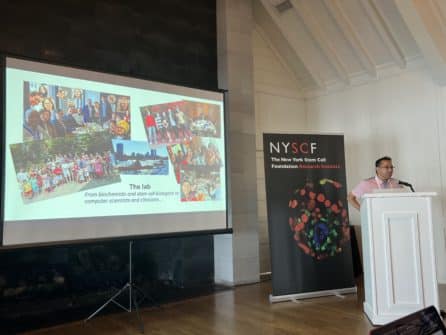
Vikram Khurana, MD, PhD, of Harvard Medical School, explained his latest findings in mapping misfolded proteins within cells, and how this is enabling new insights into the pathogenesis of neurodegenerative diseases like Parkinson’s, including the successful treatment of a Spanish family carrying an alpha-synuclein mutation, as well as his efforts to unite stem cell models with various other data types to run targeted clinical trials and find personalized therapeutic strategies.
Tips for Meaningful Mentorship
The retreat also featured a special session on mentorship, which started with a presentation by NYSCF – Robertson Neuroscience Investigator Alumnus Christopher Harvey, PhD, of Harvard Medical School, and continued into breakout discussions designed to foster mentorship connections on a range of topics.
Dr. Harvey stressed the importance of several key measures in creating a supportive lab environment, including communication and feedback, fostering inclusivity and belonging, and the different types of mentorship relationships that help to advance the careers of scientists.
One way to create a supportive lab environment is to ask your lab for feedback. Dr. Harvey shared his experiences deploying a version of a lab climate survey, pioneered by Leslie Vosshall (The Rockefeller University/Howard Hughes Medical Institute), where lab members can anonymously report attitudes on a wide range of topics like collaboration and comfortability sharing personal concerns. He spoke about working with his lab to tailor the survey to their needs, sharing the results with them, and developing an action plan together to address their feedback.
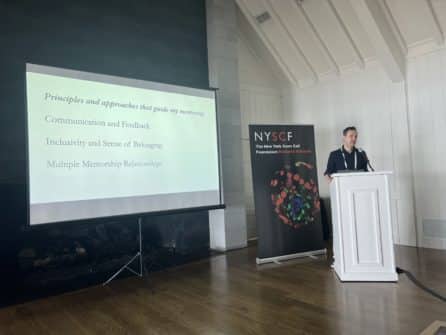
In hiring practices, Dr. Harvey advocated for holistic and equitable candidate evaluations that take into account grit, trajectory, leadership, and contextualizing unequal access to opportunities.
Within interpersonal mentoring relationships, Dr. Harvey shared the importance of helping mentees navigate challenging situations and establishing a code of conduct. In peer-peer mentoring, he noted the importance of shared career goals, personality matches, and a focus on sharing experiences rather than teaching.
A Transformational Award & Community
The Innovators stress that this program gives them the freedom to explore their biggest ideas, take their most exciting leaps, and open the door for groundbreaking new discoveries.
“The NYSCF – Robertson Investigator Award really enables us to take big risks that will hopefully have big payoffs and advance disease research in a really impactful way,” said NYSCF – Robertson Stem Cell Investigator Shruti Naik, PhD, of New York University. “Because if we keep doing things the same way over and over again, we aren’t going to get to new therapies.”
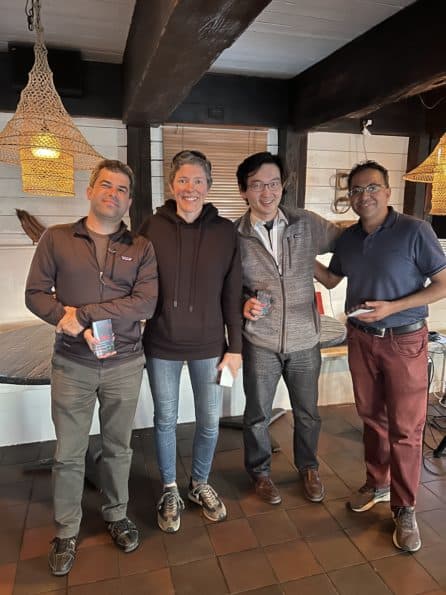
Kevin Wang, MD, PhD, of Stanford University, also pointed out some of his work that was unfundable outside of NYSCF’s support.
And beyond the life-changing nature of the award itself, becoming a part of the NYSCF community is just as critical – especially since it brings together top minds from many different facets of the stem cell and neuroscience fields to broaden how scientists think about their work.
In that spirit, Ya Chieh-Hsu, PhD, explained how a new direction in her research pointing to a neuronal involvement in hair graying was facilitated by the unique interaction between stem cell biologists and neuroscientists at the retreat.
“I think as scientists we often interact with others who are in our very specialized niches, but that can be limiting,” noted NYSCF – Robertson Neuroscience Investigator Elaine Hsiao, PhD. “Coming to this meeting and seeing the breadth of work is motivating and helps me think more creatively about how I can apply different approaches to my research.”
Perhaps the spirit of the retreat, and the NYSCF Innovator community, is best summed up by words from graduating NYSCF – Robertson Stem Cell Investigator Kevin Wang, MD, PhD, who shared a poem about his time in the program on the final night of the NYSCF Innovators Retreat: :
“NYSCF, you are my friend; You’ve made me who I am
I thank you for the journey’s end;
And for the journey’s span
And now I look ahead with hope;
To see what lies in store
To use the knowledge that you gave;
To learn and to explore. […]
You’ve also been a source of joy;
A partner and a guide
You’ve shared with me your wisdom’s voice;
And stood by me with pride
You’ve taught me how to face the unknown;
With courage and with grace
You’ve shown me how to grow and learn;
And find my rightful place.”
